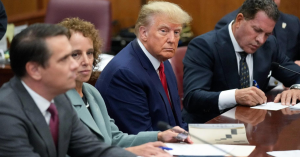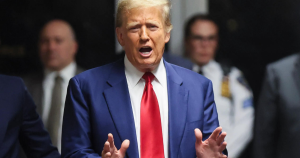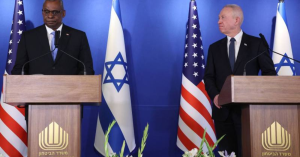The transatlantic alliance has been one of the key pillars of U.S. foreign policy and international order. However, as highlighted by analysts at institutions across the Atlantic, ranging from the Carnegie Endowment for International Peace (CEIP) to the Austria Institute for European and Security Policy (AIES) to name just two, the transatlantic alliance has been under strain in recent years.
Erik Brattberg and David Whinery, writing for CEIP, highlight that many European diplomats believe the strain is a result of serious disagreements on a range of policy issues, ideological and philosophical differences, perceived disregard of the alliance, and a lack of diplomatic decorum exhibited by both President Donald J. Trump and some of his administration’s officials. Stanley R. Sloan, a senior adviser to AIES, writes that internal weaknesses within the alliance could weaken the ability of Euro-Atlantic actors to deal with the common set of traditional and non-
traditional security challenges facing the global security community.
One particular challenge of concern to European analysts is China’s “more assertive foreignpolicy” and the impact it may have on the transatlantic alliance. Is Beijing’s approach to foreign relations really assertive or has it just simply evolved to take into consideration its role as a major-power in a multipolar order? How have its relations with the European Union (EU)
evolved? Are they really likely to have an impact on transatlantic relations? By tracing a combination of interviews on Chinese media, official statements, and policy documents from the Ministry of Foreign Affairs of the People’s Republic of China, this short article attempts to provide answers these questions. It concludes by arguing that it’s not per se Beijing’s approach to foreign relations or the nature of its growing relations with the EU that is likely to have a negative impact on the transatlantic relationship in the future. Rather, the inability of both the U.S. and China to find a more pragmatic, less-combative approach to their bilateral relations is likely to further strain the transatlantic relationship; and this is perhaps where the EU and its gradual approach to relations with Beijing can come into play to serve as the meditating role so that global leaders can navigate, hand-in-hand, the chaos of the post-COVID period.
Framing China’s Foreign Policy Approach
China’s behavior may be described as more assertive or proactive, but it does not necessary define its strategic, nuanced approach to foreign relations, which is guided by a key set of aims and principles.
According to Foreign Minister Wang Yi , China’s approach is guided by a set of aims, namely to safeguard multilateralism and project itself as a responsible global actor; to build, promote and strengthen regional and international cooperation through its participation in multilateral forums and comprehensive partnerships, and people-to-people exchanges; and, to enhance strategic trust by avoiding confrontation, rejecting military alliances, and pursuing a principled, independent foreign policy.
On multilateralism, China believes in upholding the rules-based international system, avoiding unilateralism, and fostering a more multipolar world order that allows for shared leadership among developed and developing countries. It is its emphasis on a multipolar order that elicits concern from some transatlantic analysts and European policymakers because of their fear and belief that Beijing seeks to supplant the primacy of the U.S. in world politics. However, Chinese policymakers have consistently stated that they have no intention of replacing the US. Rather, what they seek is greater cooperation among all major powers to address existing global security challenges.
As a responsible international actor, China seeks to advance and protect the legitimate rights and interests of developing countries while advancing its relations with developed and major-power countries. Chinese policymakers have continuously emphasized that China is still a developing country, thus its relations are built on the premises that stable regional and global environments are necessary for global peace and prosperity and its own development; and, win-win cooperation is the best mechanism through which to attain those global and national ends. However, they do recognize that one of the major hindrances to China’s aims is the trust deficit. Enhancing strategic trust is, therefore, a critical factor when determining how it approaches foreign relations.
According to Foreign Minister Wang Yi, the key principles underlying China’s approach include political settlements of all disputes through dialogue and the rejection of the use of force outside of UNSC authorization; respect for sovereignty by refraining from interfering in the internal affairs of other countries; and, applying a fair-and-objective approach to all issues and situations, and proceeding from there based on the merits of the matter.
In regard to dialogue and rejection of the use of force, China has consistently argued that all conflict and disputes from Crimea to Israel-Palestine should be resolved peacefully. Dialogue is the only durable solution at the end of the day. However, China does not object to the use of
force in conflicts or the use of other coercive and non-coercive measures including sanctions and peacekeeping operations when they proceed from the consensus reached within the UNSC. Although the principle of respect for sovereignty is self-evident, a qualification to its application does exists. China consents to actions taken by the international community that do interfere in the domestic affairs of states when consent is given by the parties involved (e.g. monitoring of elections, ceasefires, etc.) or when there has been a full collapse of the government in the country in question. Finally, a fair-and-objective approach to issues and situations refers to evaluating them within the context of the governing principles and laws of the international community and within the country or countries where they emerge, and proceeding from that in pursuing a course of action.
To conclude, China’s foreign policy approach and thus its relations with states should be seen within the context of its aims and principles. As all policy scholars and policymakers are aware of, discourse and rhetoric can be used to bring attention to particular policy issues and frame debates, but at the end of the day it is the aims and principles underpinning policy that matter. Therefore, it is to the aims and principles that policymakers should look to when they are contemplating whether China is a perceived threat. As will be demonstrated below in the examination of China-EU relations, Beijing’s foreign policy approach has been pursued in a strategic manner.
China-EU Relations
According to the Ministry of Foreign Affairs of the People’s Republic of China’s 2003, 2008 and 2018 policy documents on China-EU relations, relations are comprehensive and span the cultural and security fields, with 2014 being a true turning point in their expansion. Cultural relations encompass people-to-people and educational exchanges as well as
participation in fora designed to facilitate understanding of and respect for different cultures. This is an over-generalized description since space does not permit a more extensive discussion. However, it is important to note that a comparison of the policy documents highlights their expansion in years between 2014 and 2018.
Economic relations are the most expansive given that they formed the foundation of the relationship and that the European market is most critical to China’s continued growth. They include trade, investment, connectivity, and fiscal and financial fields. It should be noted that China gives priority first to the EU and then to bilateral relations with countries that are key to the expansion of the Belt and Road Initiative. The EU market is critical to Beijing’s continued growth and harmonious economic relations between both actors are critical for stability throughout Europe and Central Asia. Furthermore, China’s economic stability is critical for both Southeast Asia and Africa.
Political relations encompass high-level diplomatic and legislative exchanges, strategic dialogue on issues of importance to China’s internal security matters such as the one-China principle, Taiwan, Tibet and human rights; the institutionalization of political for a such as summits and meetings to facilitate coordination and cooperation in specific areas
including economic and security cooperation, development goals, climate change, counterterrorism, counterterrorism finance and money laundering, counter-piracy, disarmament and nuclear security, cybersecurity, and the weaponization of and arms race in space.
Security relations encompass the aforementioned political dialogue and institutionalized political measures to promote dialogue and to facilitate cooperation on key security and defense related issues; personnel exchanges at various levels in the defense and security fields and improve the strategic security cooperation mechanisms on non-traditional
security areas such as humanitarian rescue and assistance, peacekeeping, anti-piracy and escort missions through trainings, seminars and educational programs, and conducting joint exercises and missions; the police training cooperation project and exchanges on policing administration, public security management, law enforcement regulation,
criminal investigation technologies, the fight against organized crime, and cyber crimes; and, cooperation on public legal services, extradition and criminal juridical assistance for joint operations to combat transnational crimes; and, cooperation.
The two key areas raised by transatlantic analysts are economic and security relations. In the area of economic relations, policymakers are concerned over the lack of socioeconomic and financial sustainability, high-level of indebtedness and transfer of control over strategic assets and resources, and the lack of level playing field when competing with Chinese companies that enjoy access to state-backed loans and export credits and different corporate and labor standards. In the area of security cooperation, they are concerned with China’s growing military capabilities, vision and ambition. This concern was addressed by the EU and China placing greater emphasis on strategic security and non-traditional security communication and cooperation in order to build trust. Trust is key to the development of their security relations, which in turn transforms the dynamics of their political and economic relations.
To conclude, China’s approach to its relations with the European Union is strategically predictable when taking into consideration the aims and principles outlined in the previous section. Neither its approach nor the nature of China-EU relations should be perceived by U.S. policymakers as a threat to the transatlantic relationship. As Fraser Cameron highlights, Europe has sought to build on existing opportunities by employing a gradual approach to cooperation despite Beijing’s more assertive behavior. The EU’s gradual approach could perhaps be a way forward for U.S. policymakers in their relationship with China, as the current approach employed by the U.S. is untenable and likely to add to the existing strain in the transatlantic relationship.
Conclusion
This short article began by raising concerns expressed by European policymakers, namely that the strain in the transatlantic relationship prohibits transatlantic actors from coming together to deal with common challenges, particularly the perceived challenge of China’s “more assertive
foreign policy.” As was highlighted, the aims and principles of China’s foreign policy approach have been strategically consistent despite instances of discursive assertiveness in the media, and it is this consistency that has guided Beijing’s approach to its relations with the EU. The EU has employed a gradual approach to its relationship with Beijing, which has helped to facilitate trust in some areas. The introduction ended with the argument that the inability of both the U.S. and China to find a more pragmatic, less-combative approach to their bilateral relationship is potentially going to further strain the transatlantic relationship. The post-COVID period is likely to increase strain on all relationships because of rising human insecurity across the globe. All major powers including China, Russia, the EU and the U.S. are going to need to find some sort of balance in the nature of their global relationship in order to address the rise in tensions that are likely to come in each region of the globe as a result of a collision of economic, energy, health and political insecurities, all of which are dimensions of the
non-traditional security challenge of human security.
As policymakers across the globe have consistently argued for almost ten years now, non-traditional security issues are not only national security threats (recall the 2017 U.S. National Security Strategy) but also the greatest challenge to global security in the 21 st Century. Each country has a role to play and the post-COVID period requires all global actors to act responsibility including thinking about the power and problem of perception and impact on policymaking. Every policymaker should recall that discourse is powerful because its shapes perceptions of domestic audiences, and the latter matter
when policymakers are contemplating ways forward in their relations with other countries.
Author
-
Dr. Rachael M. Rudolph is an Assistant Professor of Social Science at Bryant University-BITZH Programs at the Beijing Institute of Technology, Zhuhai in Guangdong Province, China, where she teaches courses on traditional and non-traditional global security issues and conducts research on strategic security in the Indo-Pacific region and China-Gulf and China-European foreign policy and security relations. She has lived in the Asia Pacific region since 2013 and has served as an adviser to various media outlets in India and a consultant in a private capacity to actors across the globe. Dr. Rudolph also sits on the Executive Committee for the Euro-Gulf Information Center, which is located in Rome, Italy, and is presently working on a book project co-sponsored by EGIC and the Austria Institute of European Security (AIES). The views expressed in the articles she writes for NYCFPA are not per se endorsed by nor do they reflect the views of any of the institutions with whom she has an affiliation.





